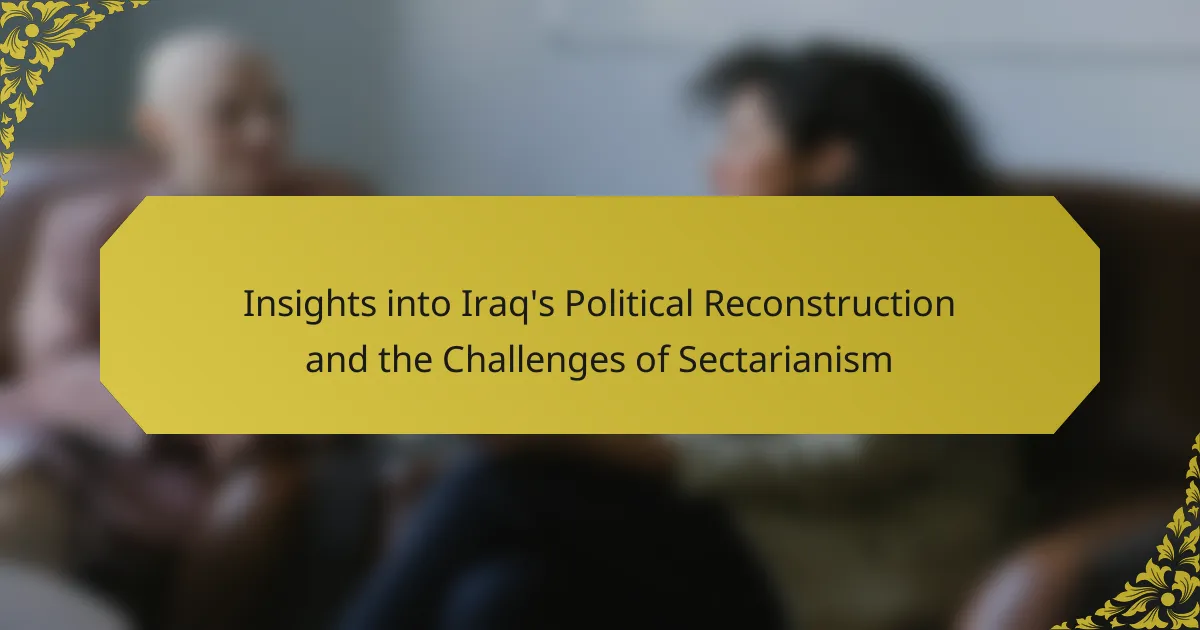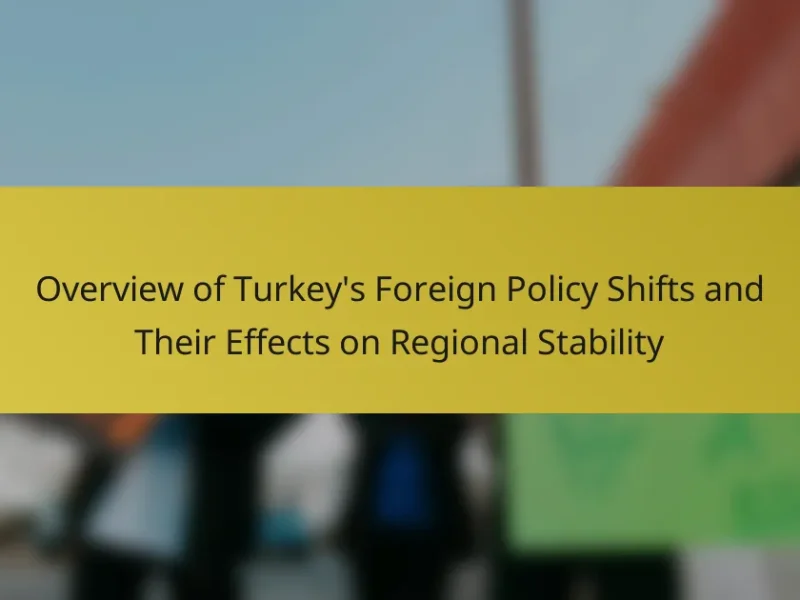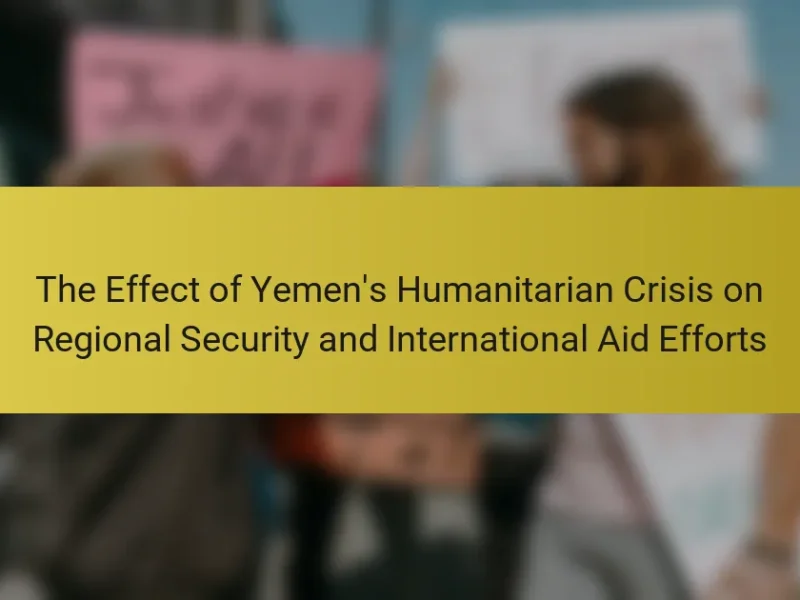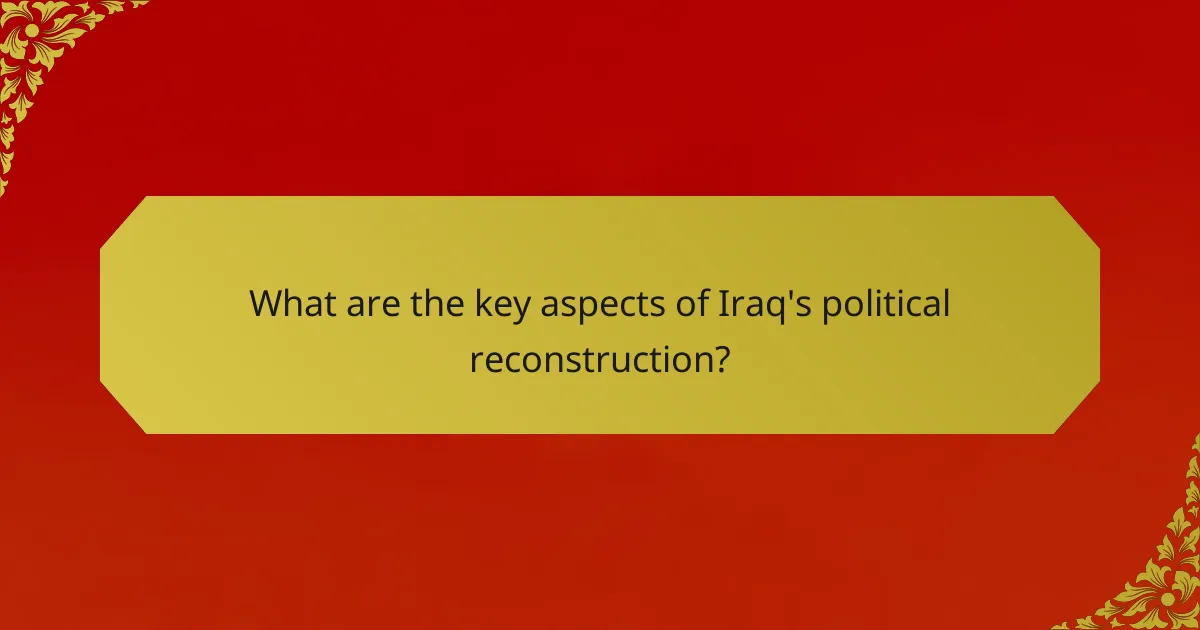
What are the key aspects of Iraq’s political reconstruction?
Key aspects of Iraq’s political reconstruction include establishing a stable government, promoting national reconciliation, and rebuilding infrastructure. The formation of a democratic government is crucial for legitimacy and public trust. National reconciliation aims to address sectarian divides and promote unity among diverse groups. Rebuilding infrastructure focuses on restoring essential services like electricity, water, and healthcare. Economic recovery is also vital for job creation and stability. International support plays a significant role in providing resources and expertise for these efforts. Finally, security measures are necessary to maintain peace and protect citizens during the reconstruction process.
How has Iraq’s political landscape evolved since 2003?
Iraq’s political landscape has significantly evolved since 2003. The U.S.-led invasion in that year dismantled Saddam Hussein’s regime. This led to the establishment of a parliamentary democracy. However, the transition faced numerous challenges. Sectarian violence surged, particularly between Sunni and Shia factions. The rise of extremist groups, such as ISIS, further complicated governance. In 2014, ISIS captured large territories, prompting international military intervention. The defeat of ISIS in 2017 was a pivotal moment for Iraq’s political stability. Recent elections have shown a shift towards independent candidates. This reflects a growing public desire for reform and accountability in governance.
What major events have shaped Iraq’s political reconstruction?
The major events that have shaped Iraq’s political reconstruction include the 2003 U.S. invasion, the subsequent fall of Saddam Hussein, and the establishment of a new government. The U.S. invasion led to significant power vacuums and instability. Following the invasion, the Coalition Provisional Authority implemented de-Ba’athification, which removed many officials from power. This policy contributed to sectarian tensions and violence. The 2005 constitutional referendum established a federal government framework. The rise of ISIS in 2014 further complicated Iraq’s political landscape, leading to military interventions and a focus on national unity. The defeat of ISIS in 2017 allowed for a renewed emphasis on rebuilding and governance. These events collectively influenced the political dynamics and reconstruction efforts in Iraq.
How do international influences impact Iraq’s political structure?
International influences significantly impact Iraq’s political structure. These influences shape governance, policy-making, and security dynamics. Foreign nations, particularly the United States and Iran, play crucial roles in Iraq’s political landscape. The U.S. led the invasion in 2003, resulting in a shift from a dictatorship to a parliamentary system. This transition was marked by the establishment of a new constitution in 2005, influenced by Western democratic ideals. Iran’s involvement has also been pivotal, as it supports various political and militia groups within Iraq. This support often leads to sectarian tensions, complicating the political environment. Additionally, international organizations, like the United Nations, contribute to political stabilization efforts through diplomatic engagement and aid. Thus, the interplay of these international influences continues to shape Iraq’s evolving political framework.
What role does sectarianism play in Iraq’s political challenges?
Sectarianism significantly influences Iraq’s political challenges. It fosters division among different religious and ethnic groups. This division complicates governance and decision-making processes. Political parties often align along sectarian lines, undermining national unity. Sectarian tensions have led to violence and instability, particularly after the 2003 invasion. The rise of groups like ISIS was partly fueled by sectarian grievances. Furthermore, sectarianism hampers effective policy implementation and public trust. Overall, sectarianism remains a critical barrier to Iraq’s political stability and reconstruction efforts.
How does sectarianism affect governance and political representation?
Sectarianism significantly undermines governance and political representation. It creates divisions within society, leading to political instability. In Iraq, sectarian identities often dictate political alliances. This results in a fragmented political landscape. Such fragmentation hinders effective governance and policy-making. Furthermore, sectarianism can marginalize minority groups. It can lead to unequal distribution of resources and power. Historical data shows that sectarian conflict in Iraq has resulted in violence and displacement. This ongoing tension complicates the establishment of a unified government. Thus, sectarianism poses a serious threat to democratic processes and stability in governance.
What are the historical roots of sectarian tensions in Iraq?
Sectarian tensions in Iraq have deep historical roots stemming from the Sunni-Shia divide. This divide originated after the death of Prophet Muhammad in 632 CE. The disagreement over his rightful successor marked the beginning of sectarian identities. Sunni and Shia groups emerged, leading to political and religious conflicts.
The Umayyad and Abbasid caliphates further solidified these divisions. During the Ottoman Empire, sectarian identities were manipulated for political control. In the 20th century, British colonial rule exacerbated tensions through favoring certain groups. Post-2003 Iraq, following the U.S. invasion, saw a power vacuum that intensified sectarian violence.
The establishment of a Shia-led government marginalized Sunni communities, fueling resentment. Historical grievances, political exclusion, and religious differences continue to perpetuate sectarian strife in Iraq today.
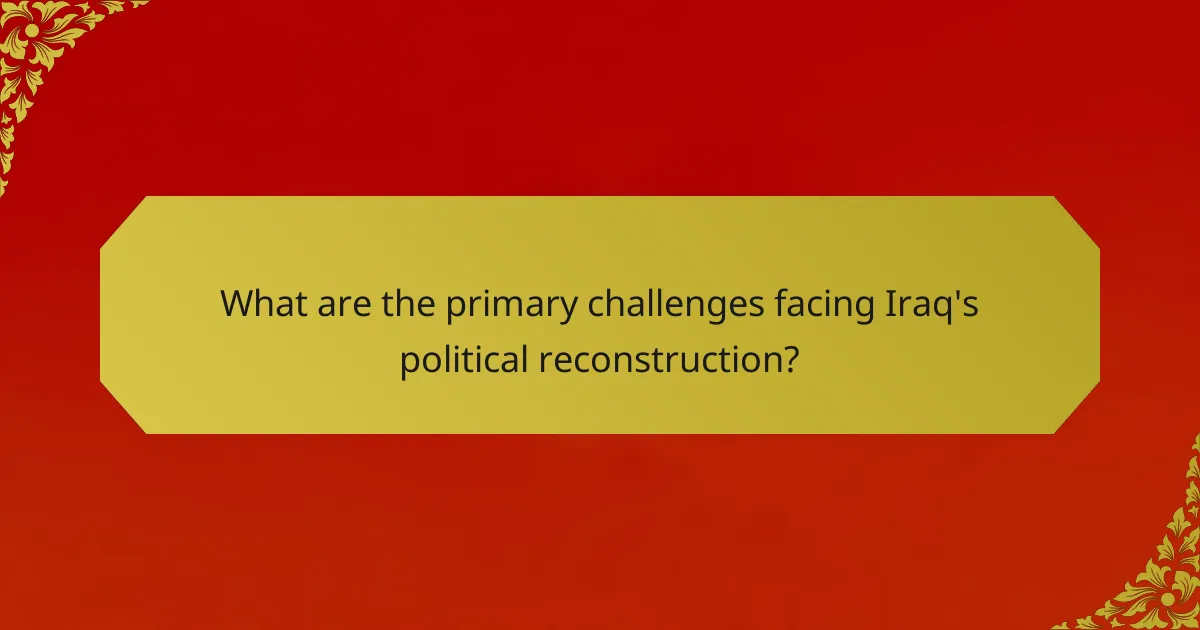
What are the primary challenges facing Iraq’s political reconstruction?
The primary challenges facing Iraq’s political reconstruction include sectarianism, corruption, and security issues. Sectarianism undermines national unity and fuels violence among different groups. Corruption hampers effective governance and resource allocation, leading to public distrust. Security issues, including the presence of extremist groups, threaten stability and hinder reconstruction efforts. Additionally, political fragmentation complicates consensus-building among diverse factions. These challenges collectively impede Iraq’s path toward a stable and democratic political system.
How does sectarian violence hinder political progress?
Sectarian violence hinders political progress by creating deep divisions within society. These divisions lead to a lack of trust among different groups. Consequently, political dialogue becomes difficult or impossible. In Iraq, sectarian violence has resulted in the fragmentation of political parties along ethnic and religious lines. This fragmentation complicates coalition-building efforts in government. The ongoing conflict distracts from essential governance issues, such as economic development. Furthermore, it fosters an environment of fear and instability. This instability discourages foreign investment and international support, which are crucial for rebuilding efforts. Historical data shows that countries experiencing high levels of sectarian violence often struggle with prolonged political instability.
What are the current statistics on sectarian violence in Iraq?
Current statistics indicate that sectarian violence in Iraq remains a significant issue. In 2023, reports show over 200 incidents related to sectarian violence. These incidents resulted in approximately 300 fatalities. The majority of these attacks targeted Shia and Sunni communities. The violence is attributed to ongoing tensions between various sectarian groups. Data from the United Nations Assistance Mission in Iraq reflects these alarming trends. The statistics highlight the urgent need for reconciliation efforts. Continued sectarian violence poses challenges to Iraq’s political stability and reconstruction.
How do sectarian divides impact national unity?
Sectarian divides significantly undermine national unity. They create social fragmentation and foster distrust among different groups. This division often leads to political instability and violence. For instance, Iraq has experienced ongoing conflict due to sectarian tensions between Sunni and Shia Muslims. Historical events, such as the 2003 invasion, exacerbated these divides. Consequently, sectarianism has hindered effective governance and national reconciliation efforts. Studies indicate that countries with deep sectarian divides face challenges in establishing cohesive national policies. Such divides can also impede economic development and social cohesion.
What are the implications of corruption on political reconstruction?
Corruption significantly undermines political reconstruction efforts. It erodes public trust in government institutions. This leads to decreased citizen engagement in the political process. Corruption also diverts resources meant for development and reconstruction. For instance, in Iraq, billions of dollars intended for rebuilding were lost to corrupt practices. Such financial mismanagement exacerbates sectarian tensions and instability. Ultimately, corruption hinders effective governance and the establishment of a functional state. This creates a cycle of dependency on external aid, further complicating political recovery.
How does corruption manifest in Iraq’s political system?
Corruption in Iraq’s political system manifests through bribery, nepotism, and embezzlement. Bribery is prevalent in securing government contracts and public services. Nepotism affects hiring practices, favoring family and friends over qualified candidates. Embezzlement occurs when officials misappropriate public funds for personal gain. Transparency International’s Corruption Perceptions Index ranks Iraq poorly, indicating widespread corruption. The lack of accountability for officials exacerbates the issue. Political parties often engage in corrupt practices to maintain power. These elements contribute to public distrust in the government and hinder effective governance.
What measures are being taken to combat corruption in Iraq?
Iraq is implementing various measures to combat corruption. The government established the Integrity Commission to investigate corruption cases. This independent body aims to promote transparency and accountability. Additionally, Iraq has enacted anti-corruption laws to strengthen legal frameworks. International partnerships with organizations like Transparency International are also in place. These collaborations focus on sharing best practices and resources. Public awareness campaigns are being conducted to educate citizens about corruption. Furthermore, the Iraqi parliament is working on reforming public sector management. These combined efforts reflect a commitment to addressing corruption challenges in Iraq.
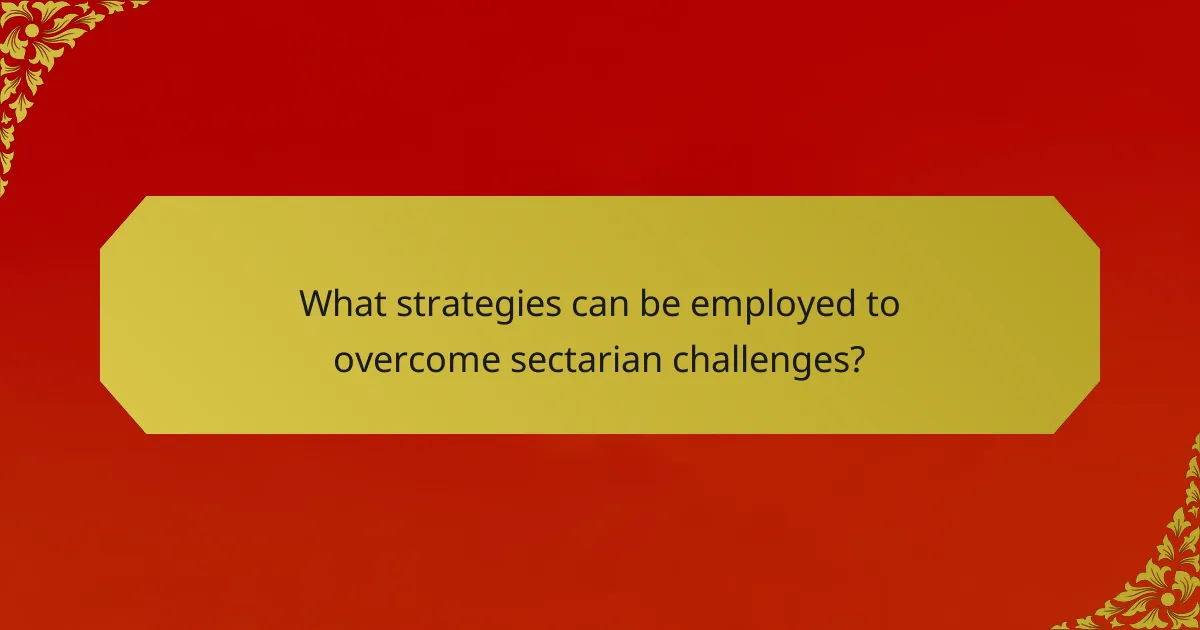
What strategies can be employed to overcome sectarian challenges?
Engaging in dialogue and fostering communication among sectarian groups is crucial to overcoming sectarian challenges. This approach encourages mutual understanding and respect. Establishing inclusive political frameworks can help integrate diverse perspectives into governance. Implementing educational programs that promote tolerance and coexistence is essential for long-term change. Supporting grassroots initiatives that bridge divides can empower communities to work together. Promoting economic development in marginalized areas can reduce sectarian tensions by addressing underlying grievances. International mediation can facilitate negotiations and promote peace processes. Historical examples, such as post-conflict reconciliation in South Africa, demonstrate the effectiveness of these strategies in overcoming sectarian challenges.
How can inclusive governance promote national reconciliation?
Inclusive governance can promote national reconciliation by fostering participation and representation among diverse groups. It encourages dialogue and collaboration between conflicting factions. This approach helps address grievances and build trust among communities. For example, inclusive governance in post-conflict societies has shown to reduce tensions and promote stability. Research indicates that nations with inclusive political systems experience lower levels of violence. By ensuring that all voices are heard, inclusive governance can create a sense of ownership and shared responsibility. This leads to more sustainable peace and unity in divided societies.
What examples of successful inclusive governance exist in Iraq?
Successful inclusive governance examples in Iraq include the establishment of the National Reconciliation Commission in 2006. This commission aimed to promote dialogue among various sectarian groups. It facilitated the return of displaced individuals and aimed to integrate marginalized communities. Another example is the 2018 parliamentary elections. These elections saw a record voter turnout and included diverse political parties. The elections allowed for representation from various ethnic and sectarian groups. Additionally, the Iraqi government has implemented programs to support minority rights. These initiatives focus on ensuring participation in local governance. These examples demonstrate efforts to foster inclusivity in Iraq’s political landscape.
How can community engagement foster unity among sects?
Community engagement can foster unity among sects by promoting dialogue and collaboration. It encourages individuals from different sects to interact and understand each other’s perspectives. Engaging in community projects can build trust and shared goals. For example, joint initiatives in education or healthcare can bring diverse groups together. Research shows that such collaborations reduce prejudice and enhance social cohesion. Programs that involve shared cultural events can also strengthen bonds among sects. In Iraq, community engagement has been vital in addressing sectarian divides. It has helped create a sense of belonging and mutual respect among various groups.
What role does education play in addressing sectarianism?
Education plays a crucial role in addressing sectarianism by promoting tolerance and understanding among diverse groups. It provides individuals with the knowledge necessary to challenge stereotypes and prejudices. Educational programs that focus on shared values can foster a sense of community. For example, curricula that include the history and contributions of various sects can help students appreciate different perspectives. Studies indicate that education can reduce sectarian violence by encouraging dialogue and cooperation. Research from the World Bank shows that education contributes to social cohesion in post-conflict societies. By equipping individuals with critical thinking skills, education empowers them to reject extremist ideologies. Overall, education serves as a foundational tool for building a more inclusive society.
How can educational reforms contribute to reducing sectarian divides?
Educational reforms can significantly reduce sectarian divides by promoting inclusivity and understanding among diverse groups. By integrating a curriculum that emphasizes shared history and values, students can learn about each other’s cultures. This approach fosters empathy and reduces stereotypes. Additionally, training teachers to handle sectarian issues sensitively can create a more harmonious classroom environment. Research indicates that education systems that prioritize critical thinking over rote memorization encourage open dialogue among students. Countries with successful educational reforms, such as post-apartheid South Africa, have demonstrated that inclusive education can bridge societal divides. Implementing these strategies in Iraq could lead to a more cohesive society and mitigate sectarian tensions.
What initiatives are currently in place to promote tolerance in education?
Currently, initiatives promoting tolerance in education in Iraq include curriculum reforms and teacher training programs. The Iraqi Ministry of Education has introduced inclusive curricula that emphasize coexistence and mutual respect among different sects. Various NGOs, such as the International Organization for Migration, are implementing training sessions for educators. These sessions focus on conflict resolution and teaching methods that foster tolerance. Additionally, community-based programs encourage dialogue among students from diverse backgrounds. These efforts aim to reduce sectarian tensions and promote a culture of peace in schools.
What best practices can be implemented for Iraq’s political stability?
Promoting inclusive governance is essential for Iraq’s political stability. This involves ensuring representation from all sects and ethnic groups in government. Establishing a national dialogue can help address grievances among diverse communities. Strengthening civil society organizations fosters grassroots participation in political processes. Implementing anti-corruption measures enhances public trust in government institutions. Encouraging economic development reduces reliance on sectarian identities for political support. International partnerships can provide resources and expertise for sustainable governance reforms. Historical evidence shows that inclusive policies contribute to long-term stability in post-conflict societies.
How can international partnerships support Iraq’s reconstruction efforts?
International partnerships can significantly support Iraq’s reconstruction efforts through financial aid, technical expertise, and capacity building. Financial aid from international donors can help rebuild infrastructure damaged by conflict. For instance, the World Bank has committed billions to support Iraq’s recovery since 2017. Technical expertise from foreign governments and organizations can enhance local skills in construction and governance. Countries like the United States and Germany have provided training programs for Iraqi engineers and administrators. Capacity building initiatives can strengthen local institutions, promoting sustainable governance. Programs funded by the United Nations focus on community development and social cohesion. Collaborative projects can also foster economic growth by attracting foreign investment. Overall, these partnerships create a framework for long-term stability in Iraq.
What lessons can be learned from other post-conflict nations?
Post-conflict nations provide valuable lessons on rebuilding and reconciliation. Successful transitions often involve inclusive governance to accommodate diverse groups. For instance, Rwanda’s power-sharing model after the genocide helped stabilize the nation. Economic recovery is also crucial; countries like Bosnia and Herzegovina focused on rebuilding infrastructure to stimulate growth. Addressing grievances through truth and reconciliation commissions, as seen in South Africa, can foster healing. International support and monitoring can ensure adherence to peace agreements, exemplified by the United Nations’ role in East Timor. Lastly, promoting civil society involvement is essential for sustainable peace, as demonstrated in Liberia’s recovery efforts.
The main entity of the article is Iraq’s political reconstruction. The article provides a comprehensive overview of the key aspects of Iraq’s political reconstruction, including the establishment of a stable government, national reconciliation, and infrastructure rebuilding, while addressing the challenges posed by sectarianism, corruption, and security issues. It outlines the evolution of Iraq’s political landscape since 2003, major events that have shaped its reconstruction, and the significant role of international influences. The article also examines the impact of sectarian divides on governance and national unity, alongside strategies for inclusive governance and community engagement to promote stability and reconciliation in Iraq.
